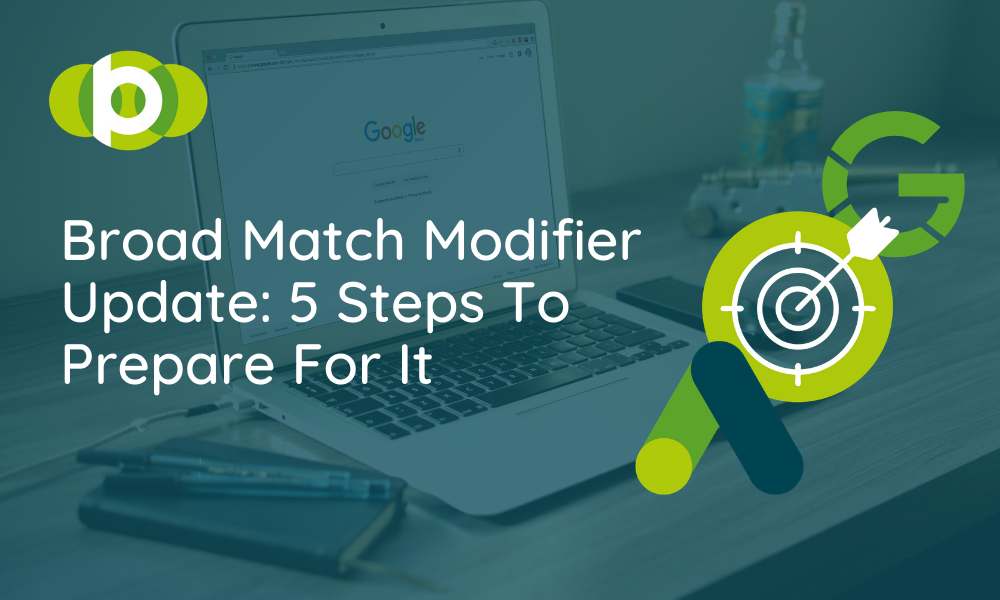Google has announced that it is phasing out Broad Match Modifier (BMM) match type. With a large number of accounts using BMMs this could have a huge impact on your account.Don’t get caught out and get prepared with our 5 steps below.
First of all, let’s start with a quick reminder…
What Are Google Keyword Match Types?
Keywords are words or phrases that are used to match ads with the terms people are searching for. The Keyword Match Types dictate how closely the keyword needs to match the user’s search query in order for the ad to be considered for the auction.
As an advertiser you have the option of casting a wide net or you can hone in to capture specific searches.
“There are 4 match types in Google Ads…”
Broad Match: Ads show on searches that are related to your keyword
Broad match is the default match type that all your keywords are assigned if you don’t specify another match type. These can include searches that don’t contain the keyword terms. This helps you attract more visitors to your website.
Broad Match Modifier (BMM): Additional words may appear in the search
Additional words may appear in the search before, after or in between your ‘+’ terms. For example, the broad match modified keywords +red +shoes can match a search for ‘shoes for sale that are red’ or ‘red men’s shoes’, but not for ‘blue shoes’ or ‘red hiking boots’. This extra degree of specificity can help increase how relevant searches are to your ads, and improve your click-through (CTR) and conversion rates.
Phrase Match: Searches include the meaning of your keyword
Ads may show on searches that include the meaning of your keyword. The meaning of the keyword can be implied, and user searches can be a more specific form of the meaning. Phrase match is more flexible than exact match, but is more targeted than the default broad match option. With phrase match, you can reach more customers, while still showing your ads to customers who are most likely searching for your product or service.
Exact Match: Same meaning or same intent as the keyword
Ads may show on searches that have the same meaning or same intent as the keyword. Of the three keyword matching options, exact match gives you the most control over who sees your ads. (Google 2021)
What is Google changing with Broad Match Modifier Keywords?
From February 2021 Phrase match will include behaviors normally attributed to broad match modifier (BMM). This has been done in order to simplify keywords and help advertisers reach a more fitting audience. In other words, phrase match & broad match modifier (BMM) will now match similar behaviour and ‘may show ads on searches that include the meaning of your keyword’ (Google 2021).
This change will only apply in the following languages: English, German, Spanish, French, Italian, Dutch, Portuguese, and Russian
Learn more about the rollout of this change in other languages (Google 2021).
How does the new phrase match work?
The new Phrase Match is looking beyond just keywords, and this has been put in place to prepare for voice search. For example, if you’re searching for ‘customer service in the hospitality sector’, you are essentially searching for ‘customer service’ in this sector. Therefore, where originally Broad Match Modifier keywords may have triggered for ‘hospitality service’, this will no longer match, as the new Phrase match goes beyond just keywords and will take into account the intent behind your search.
The examples below show how these broad match modifier (BMM) keywords will not match a search query after Googles update:
| BMM Keyword | Search Query that will no longer match after Google update |
| +financial +services | Customer service in financial institutions |
| +best +boots | Best deals on children’s boots |
| +used +cars | Companies that used Renault cars for a taxi service in 2020 |
Below are some examples where phrase match will match a search query after Google’s update:
| Phrase Match Keyword | Search Query that will match after Google update |
| “boys trainers” | New boys blue trainers size 7 |
| “holiday in kenya” | Holiday resort in Kenya |
| “sequin dress” | Black sequin short sleeve dress |
In addition to this, it is important to note that if you’re searching for ‘travel services London to Manchester’ the new phrase match won’t show ads for users searching for this service when the direction is reversed, such as from Manchester to London.
5 steps to prepare for this change
1. Monitor Performance:
Undoubtedly this should be done on a regular basis regardless of these changes. Like with any BIG changes it is safe to say there would be some impact on traffic, and ultimately, the performance. Also, if your account structure is based on keyword match types (e.g. separate campaigns or ad groups for BMM, Broad, Phrase or Exact match type), this might require you to rethink about the bigger picture campaigns or traffic strategy. We estimate traffic could fluctuate during and after the transition period, so it’s important to be proactive and make adjustments where required (e.g. shift the budget towards better performing campaigns).
2. Broad Match with Smart Bidding:
If you’re worried about losing traffic to your ads, consider using broad match keywords combined with Smart Bidding, this will help you reach more relevant search queries. ‘Google sometimes takes into consideration the following: the user’s recent search activities, the content of the landing page & other keywords in an ad group to better understand keyword intent. On average, advertisers that switch their phrase match and broad match modified keywords to broad match can see more conversions and a higher conversion value.’ (Google 2021)
3. Use & Test Phrase Match
Nothing will give you a better understanding of the new phrase match capabilities than trying them out for yourself. Added to this, the sooner you begin to use new Phrase match keywords, the sooner your accounts will benefit from machine learning. Here at Broadplace, we started testing new ad groups with Phrase match keywords to compare the performance with the other match type keywords (BMM and Broad). We’re doing this because as much as we believe Google when they say “on average, the advertisers should benefit from this change”, but this “on average” element means, there will be both, the accounts affected positively, as well as, affected negatively by the change – and we don’t want to be caught up in the latter. So, we truly believe in testing, testing, testing ourselves. In addition to this, you can run some A/B testing and after a period of time, measure performance.
4. Negative Keywords
The Negative match keywords are not affected by this change, but remember to take a moment to review the negative keywords you are currently using in your accounts in order to ensure you are not excluding any potential traffic when using the new phrase match type. Also, keep reviewing the search queries to identify any irrelevant terms to add them as negative keywords.
5. Check the Recommendations tab
As much as some of Google’s suggestions might not be super relevant, there will be some good quality search terms to be considered to add as new keywords and in this case, why not make them Phrase match types? Also, if you use Broad match with Smart Bidding (see point 2 above) Google will identify existing keywords that are likely to improve performance and will automatically surface these opportunities to you on the Recommendations tab.
Final Thoughts
Do you need to go into your Google Ads account and change all your keywords? No, you don’t.
Traditionally advertisers may have relied on Broad Match Modifier to compliment their exact match targeting, using the Broad Match Modifier match type to help find broader relevant keywords.
With time, advertisers will need to adapt and take into account these new functionalities offered by Google’s Phrase Match but for now you can consider using our 5 step guide above to help you find the best account structure for your business.
The main thing to bear in mind is that this change is designed to work specifically with Smart Bidding and automation. In other words, looking at where decisions are made on the search query rather than just the keyword. This has been developed to future proof search in the wake of more long-tail searches and voice search.

